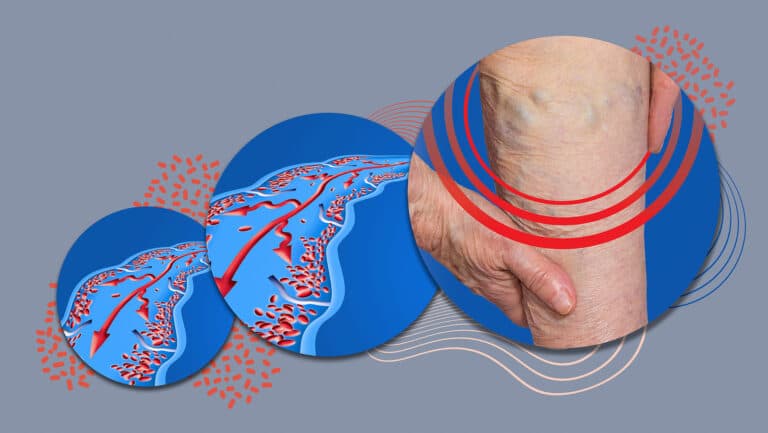March is DVT Awareness Month. This is a great time to learn more about how DVTs can effect seniors an how home care assistance can help.
As we age, we become more susceptible to developing potentially serious medical conditions. Deep vein thrombosis (DVT) is one such condition that can be dangerous if not monitored and treated properly. Many seniors are unaware of the risk of developing a DVT or how it can impact their health and well-being.
Fortunately, home care assistance services offer a variety of ways to help seniors monitor, prevent and recover from this life-threatening condition. In this article, we’ll look at how home care assistance can provide invaluable assistance for seniors dealing with a DVT.
Table of Contents
ToggleWhat Is DVT And Who Is At Risk?
DVT stands for ‘Deep Vein Thrombosis’, a condition that occurs when a blood clot forms in a deep vein, usually in the legs. It can be caused by a number of factors such as lack of movement, obesity, smoking, and certain medical conditions. People who are over 60 years old and who have recently undergone surgery are at an increased risk for developing DVT.
The Signs and Symptoms of DVT
It’s important to know that not all cases of DVT present with symptoms, but those that do often show signs such as:
- pain in the affected area
- swelling in one leg or arm
- redness in the skin
- warmth over the affected area
- cramping sensations or tenderness when touched
Seniors should also look out for shortness of breath and chest pains that could indicate pulmonary embolism (PE) which is a complication of DVT. Home care assistance can help seniors monitor these symptoms by providing regular check-ins or assistance with activities if mobility is limited due to DVT-related pain.
The Dangers Of DVT
The dangers of deep vein thrombosis (DVT) should not be taken lightly, as this condition can have serious repercussions, such as:
- DVT occurs when a blood clot forms in a vein deep within the body, usually in a person’s leg.
- The clot can block or partially block the flow of blood and cause swelling, pain, and tenderness in the affected area.
- It can lead to complications such as pulmonary embolism (PE), which is a potentially fatal condition where the clot travels to an artery in the lungs.
- If left untreated, DVT could cause permanent damage to veins and lead to long-term disability.
Although there may be no visible signs of DVT at first, it’s important to be aware of potential warning signs such as leg pain or tenderness, swelling in one or both legs, skin discoloration around the affected area, and warmth around the affected area. Anyone suffering from any of these symptoms should seek medical attention right away for proper diagnosis and treatment.
How Home Care Assistance Can Help Monitor DVT
Home care assistance can be an invaluable resource for seniors trying to recover from a deep vein thrombosis (DVT). They can provide experienced and knowledgeable support, including helping with monitoring of the condition. Firstly, home care can help seniors manage the lifestyle changes they will need to make while recovering from a DVT. This includes things like:
- increasing exercise levels
- quitting smoking
- eating healthier
- emotional support
- remind seniors to take medications
- ensure they are following their doctor’s orders
Home care workers may also be able to assist with compression stockings if required by the senior’s doctor.
Finally, it is important for seniors recovering from DVT to have emotional support throughout their journey back to health. Home care professionals might suggest strategies for managing stress levels such as mindfulness or relaxation techniques. They’ll also provide compassionate and empathetic companionship which is crucial in helping someone through a difficult time in their life.
By offering these kinds of support services, home care assistants enable seniors to better manage their condition and improve their overall quality of life while recovering from a DVT.
What Home Care Assistance Can Do To Aid In Recovery
Home care assistance can provide seniors with a variety of supports to help them manage and recover from a DVT. These services can include mobility assistance, medical monitoring, medication management, and other tasks that are essential for the recovery process. With these services, seniors can receive the necessary support and attention to help them monitor their condition and make sure that it is well managed.
It is of utmost importance for seniors to be aware of the risk factors associated with developing DVT and to take steps to reduce their risk. Home care assistance can help seniors monitor their health and ensure they are following proper safety precautions in order to avoid developing DVT.
These services also provide assistance with daily activities, so seniors can remain independent while recovering from a DVT.
Overall, home care assistance can provide a range of benefits for seniors who are at risk of or recovering from a DVT. By monitoring their condition closely and ensuring they are taking appropriate preventative measures, these services can help seniors remain safe and independent while living with this condition. With the right resources in place, seniors can stay healthy and enjoy a higher quality of life despite having a DVT diagnosis.
If you or an aging loved-one is considering Home Care Assistance in Coatesville, PA please contact the caring staff at Harmony Companion Home Care today. (610) 910-6015
- Financial Compensation for Family Caregivers - June 9, 2023
- Consider Becoming a Professional Caregiver For Your Relatives - June 8, 2023
- Attention Caregivers! - June 7, 2023

